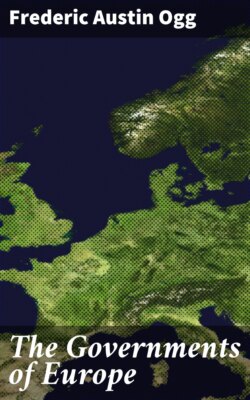Читать книгу The Governments of Europe - Frederic Austin Ogg - Страница 28
На сайте Литреса книга снята с продажи.
IV. Privy Council, Ministry, and Cabinet
Оглавление61. The Privy Council.—One who would understand the modes by which the powers of the crown are in practice exercised must begin by fixing firmly in mind the nature and relations of three distinct but closely interrelated institutions, the Privy Council, the ministry, and the cabinet. As has appeared, the Privy Council through a long period of English history comprised the body of men who advised the crown and assisted to some extent in the supervision of administration. The number of councillors from time to time varied widely, but it tended constantly to be too large to admit of the requisite despatch and secrecy, and by reason principally of this consideration the crown fell into the custom of selecting as advisers a group of persons less numerous, and perhaps more trustworthy, than the whole body of public functionaries collectively designated as the Privy Council. Thus arose the cabinet, which throughout its entire history has been only an inner circle, unknown to the law, of the older and larger body. The Privy Council survives to-day, and in both law and theory it still is the advisory body of the crown. A cabinet member possesses authority and is known to the law only as a privy councillor. In point of fact, however, the Privy Council, once highly influential in affairs of state, is now, as such, all but powerless. Such portions of the dignity of its ancient place in the constitution as remain to it are of a purely formal and ceremonial nature. It holds no meetings of a deliberative character, and although legally its action is still essential to many public measures, as the preparation of proclamations and of orders in council, this action may be taken by as few as three persons.[80] All cabinet members are members of the Council, so that even one-fifth or one-sixth of the cabinet group is competent to meet every legal requirement imposed upon the Council as a whole.[81] All councillors are appointed by the crown and continue in office for life or until dismissed. Their number is unlimited, and the only qualification necessary for appointment is British nativity. Members fall into three groups: (1) members of the cabinet; (2) holders of certain important non-political offices who by custom are entitled to appointment; (3) persons eminent in politics, literature, law, or science, or by reason of service rendered the crown, upon whom the dignity is conferred as an honorary distinction. Members bear regularly the title of Right Honorable. The President of the Council, designated by the crown, takes rank in the House of Lords next after the Chancellor and Treasurer.[82]
62. Ministry and Cabinet.—Another governmental group which, like the Privy Council, differs from the cabinet while containing it, is the ministry. The ministry comprises a large and variable body of functionaries, some of whom occupy the principal offices of state and divide their efforts between advising the crown, i.e., formulating governmental policy, and administering the affairs of their respective departments, and others of whom, occupying less important executive positions, do not possess, save indirectly, the advisory function. The first group comprises, approximately at least, the cabinet. Most heads of departments are regularly and necessarily in the cabinet. A few are in it as a rule, though not invariably. A few, still less important, may be, but are not likely to be, admitted to it. And, finally, a large number of parliamentary under-secretaries, party "whips," and officers of the royal household are certain not to be admitted.[83]
